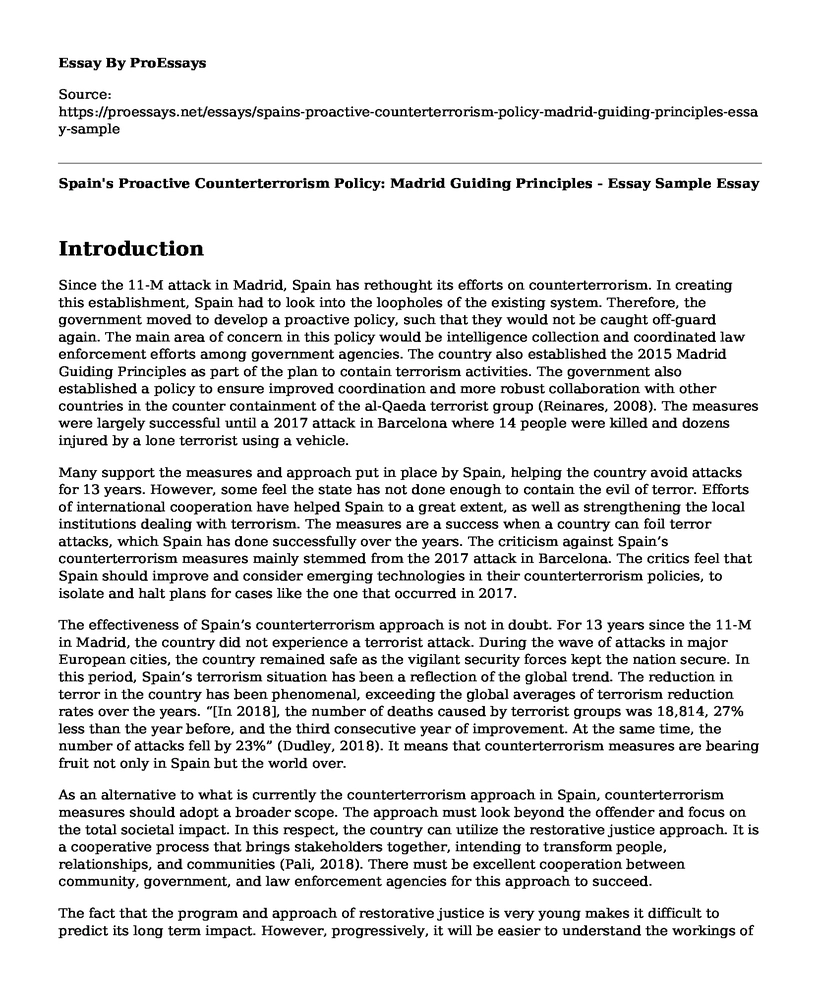Introduction
Since the 11-M attack in Madrid, Spain has rethought its efforts on counterterrorism. In creating this establishment, Spain had to look into the loopholes of the existing system. Therefore, the government moved to develop a proactive policy, such that they would not be caught off-guard again. The main area of concern in this policy would be intelligence collection and coordinated law enforcement efforts among government agencies. The country also established the 2015 Madrid Guiding Principles as part of the plan to contain terrorism activities. The government also established a policy to ensure improved coordination and more robust collaboration with other countries in the counter containment of the al-Qaeda terrorist group (Reinares, 2008). The measures were largely successful until a 2017 attack in Barcelona where 14 people were killed and dozens injured by a lone terrorist using a vehicle.
Many support the measures and approach put in place by Spain, helping the country avoid attacks for 13 years. However, some feel the state has not done enough to contain the evil of terror. Efforts of international cooperation have helped Spain to a great extent, as well as strengthening the local institutions dealing with terrorism. The measures are a success when a country can foil terror attacks, which Spain has done successfully over the years. The criticism against Spain’s counterterrorism measures mainly stemmed from the 2017 attack in Barcelona. The critics feel that Spain should improve and consider emerging technologies in their counterterrorism policies, to isolate and halt plans for cases like the one that occurred in 2017.
The effectiveness of Spain’s counterterrorism approach is not in doubt. For 13 years since the 11-M in Madrid, the country did not experience a terrorist attack. During the wave of attacks in major European cities, the country remained safe as the vigilant security forces kept the nation secure. In this period, Spain’s terrorism situation has been a reflection of the global trend. The reduction in terror in the country has been phenomenal, exceeding the global averages of terrorism reduction rates over the years. “[In 2018], the number of deaths caused by terrorist groups was 18,814, 27% less than the year before, and the third consecutive year of improvement. At the same time, the number of attacks fell by 23%” (Dudley, 2018). It means that counterterrorism measures are bearing fruit not only in Spain but the world over.
As an alternative to what is currently the counterterrorism approach in Spain, counterterrorism measures should adopt a broader scope. The approach must look beyond the offender and focus on the total societal impact. In this respect, the country can utilize the restorative justice approach. It is a cooperative process that brings stakeholders together, intending to transform people, relationships, and communities (Pali, 2018). There must be excellent cooperation between community, government, and law enforcement agencies for this approach to succeed.
The fact that the program and approach of restorative justice is very young makes it difficult to predict its long term impact. However, progressively, it will be easier to understand the workings of the program and predict likely outcomes of the program in the future. In the initial stages, the approach should examine people’s willingness to participate and come together in developing a mechanism to deal with terrorism at the community level (Pali, 2018). Members of the society should be willing to share information with law enforcement voluntarily and should be ready to listen and help the victims of terror. In the eventual outcome of societal forgiveness sin place of retribution, the approach shall be a success.
References
Dudley, Dominic. (2018, Dec. 5). Terrorism In Decline: Number Of Deaths By Terrorist Groups Falls For Third Year In A Row. Forbes. Retrieved May 31, 2020 from, https://www.forbes.com/sites/dominicdudley/2018/12/05/terrorism-in-decline/#6a6f534e203c.
Pali, Brunilda. (2018, Oct. 11). Restorative justice and terrorism: resisting evil with non-evil? Security Praxis. Retrieved May 31, 2020 from, https://securitypraxis.eu/restorative-justice-and-terrorism/.
Reinares, Fernando. (2008, Oct. 15). After the Madrid Bombings: Internal Security Reforms and Prevention of Global Terrorism in Spain. Taylor Francis Online. Retrieved May 31, 2020 from, https://www.tandfonline.com/doi/abs/10.1080/10576100902836767
Cite this page
Spain's Proactive Counterterrorism Policy: Madrid Guiding Principles - Essay Sample. (2023, Aug 21). Retrieved from https://proessays.net/essays/spains-proactive-counterterrorism-policy-madrid-guiding-principles-essay-sample
If you are the original author of this essay and no longer wish to have it published on the ProEssays website, please click below to request its removal:
- Gender in the Workplace Essay
- Does America Need A Single-Payer Health Care Plan? - Essay Sample
- Paper Example on Terrorism After Cold War
- Food Addiction Paper Example
- Policies of Social Media in India Paper Example
- Essay Example on NYC: A Melting Pot for Immigrants: 4 Decades of Transformation
- Essay Example on Badia on Trial: Sexual Abuse and Sodomy of 5-Yr-Old







